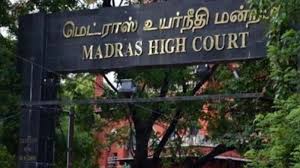
Source: www.hcmadras.tn.nic.in
Recently, in the case of Thiagrarajan Kumararajan vs Union of India, the Madras High Court opined that Aadhaar number is necessary to file Income Tax returns. It dismissed a plea by Preethi Mohan refusing to allow filing of Income Tax return without producing Aadhaar number and enrolment ID.
Brief Background –
- Thiagrarajan Kumararajan (hereinafter referred as ‘the Petitioner’) is practicing as an advocate.
- The writ petition was filed by the Petitioner under Article 226 of the Constitution of India, praying for a direction to The Income Tax Officer (hereinafter referred to as the ‘Respondent No. 3’) to allow it to file income tax returns for the assessment year 2017-18, either manually or through e-filing facility without insisting for production of an aadhar number/card or enrollment identity as defined under Section 139AA of the Income Tax Act, 1961 (hereinafter referred as ‘the Act’).
Petitioner’s Contentions-
- The Petitioner submitted that the Hon’ble Supreme Court, in the case of Binoy Viswam Vs. Union of India [1], granted a partial stay of the Proviso under Sub-Section (2) of Section 139AA of the Act.
- Further, it submitted that the Respondents cannot insist that persons like the Petitioner, who have not enrolled under the Aadhaar Act and who do not wish to enroll themselves, must quote their aadhaar number or their enrollment ID in order to file their income tax returns in accordance with Section 143 (1) of the Act.
Respondents Contentions
- They contended that the Petitioner had misread the case of Binoy Viswam. In that case, the provisions of Section 139AA of the Act were upheld and the partial stay in that case was only restricted to transactions mentioned in Rule 114B of the Income Tax Rules, hence, the Petitioner cannot be permitted to file ITR without the Aadhar number.
Court’s Decision –
- Analyzing the judgment in the case of Binoy Viswam, the Court pointed out that ‘on one hand the enrollment under the Aadhar Act is voluntary, however, it is compulsory under the Income Tax Act, which means that as far as the Income Tax Act is concerned, the Aadhar is mandatory, so the people who want to pay income tax need to be registered under the Aadhar Act.’
- It rejected the contention that enrollment shouldn’t be made mandatory as the two acts serve very different purpose and if for the purpose of the Income Tax Act the government does want to make the Aadhar compulsory, they should be allowed to do so. Also, it is the prerogative of the Parliament to make a particular provision directory in one Statute and mandatory/compulsory in the other and that by itself cannot be a ground to question the competence of the Legislature.
- After bifurcating Section 139AA of the Act into two parts, the Court observed that PAN is mandatory under Rule 114B, it was also noted that that PAN is a necessity in doing business and revoking a person’s PAN can be seen as taking away their right to business as one can’t pay Income Tax without a PAN.
- Further, again discussing the judgement in the case of Binoy Viswam, the Court opined that:
- the provision of making Aadhar compulsory was made to associate Aadhar with the PAN to curb the usage and duplication of the PAN. Hence, these conditions are not violating Articles 14 and 21 of the Constitution.
- Even then, persons who are not PAN holders, while applying for PAN, they are required to give Aadhaar number. At the same time, as far as existing PAN holders are concerned, since the impugned provisions are yet to be considered on the touchstone of Article 21 of the Constitution a partial stay of the aforesaid proviso is necessary.
- Those who have already enrolled themselves under Aadhaar scheme would comply with the requirement of sub-section (2) of Section 139AA of the Act. However, those assessees who are not Aadhaar card holders and do not comply with the provision of Section 139 (2), their PAN cards be not treated as invalid for the time being. It is only to facilitate other transactions which are mentioned in Rule 114B of the Rules.
- This course of action was taken due to the consequences of not adhering to the Aadhar requirements, which the Court thought wasn’t too severe.
- According to the Court, the balance of convenience was in the Petitioner’s favor as it was the last day of filing ITR, and if the Petitioner did not file their ITR she may be liable for payment of interest due to late filing. Hence, the Court gave an interim direction to let the Petitioner file the ITR without Aadhar.
- Therefore, to state that the partial stay granted by the Hon’ble Supreme Court would ensure to the benefit of the Petitioner even for filing income tax returns is a plea, which is not sustainable and is liable to be rejected.
Thus, for all the above reasons, the Court found no grounds to entertain the writ petition. The writ petition was dismissed.

